COVER STORY:
India Outraged: Demands Justice for Victim of Brutal Gang Rape in Delhi
Heinous crimes against women in India are among the worst in the world, whether dowry deaths, rape, honor killings, female infanticide and feticide.
The gang rape of a young medical student in South Delhi has shocked the nation and ignited outrage across the country. The entire nation is now calling for a strong sentence for the guilty and for major reforms to the current justice system, writes Siddharth Srivastava.
In the wake of this incident and many more that have gone untold, people across the globe have voiced concerns in many different ways. The vigils in San Francisco Bay Area saw the outrage over the Indian government’s inaction in bringing justice to the victim and a call for expediting the process, writes Viji Sundaram.
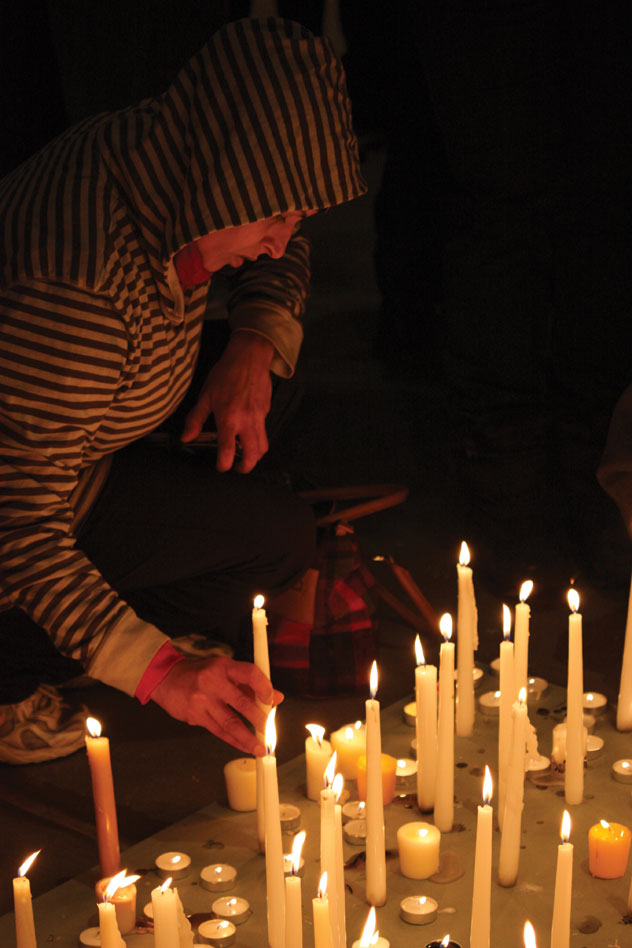 (Above): A woman lights a candle at the candlelight vigil to remember the 23-year-old student who was gang raped in Delhi, Dec. 16, and subesquently succumbed to injuries, at Lake Elizabeth Park in Fremont, Calif., Jan. 6. Over a hundred supporters braved the cold weather and rain to offer support to the cause. [Amar D. Gupta | Siliconeer] (Above): A woman lights a candle at the candlelight vigil to remember the 23-year-old student who was gang raped in Delhi, Dec. 16, and subesquently succumbed to injuries, at Lake Elizabeth Park in Fremont, Calif., Jan. 6. Over a hundred supporters braved the cold weather and rain to offer support to the cause. [Amar D. Gupta | Siliconeer]
The gang rape and murder of a young medical student in South Delhi has shocked the nation and ignited outrage across the country.
The 23-year-old woman was assaulted late in the evening in a bus by a group of young men in who stripped and left her and a male friend to die on the road.
The woman, whose name has been kept private as per Indian laws, struggled for life in a Delhi hospital, with doctors saying that her vital organs, including the intestines, have been permanently damaged.
Following cardiac arrest and brain damage, she was shifted in an air ambulance to Singapore for advanced treatment. She, however, died there, following, what doctors said, was a heroic struggle to survive, despite her grave injuries.
All the six men who attacked her, including a minor accused of brutalizing her by inserting an iron rod inside her vagina, have been arrested.
Following the assault, a consensus is emerging among state authorities to reduce the age of juveniles from 18 to 16. The men attacked the young woman for being out alone at night with a male companion. When he attempted to intervene, they beat him with an iron rod. He was initially hospitalized but has since been released.
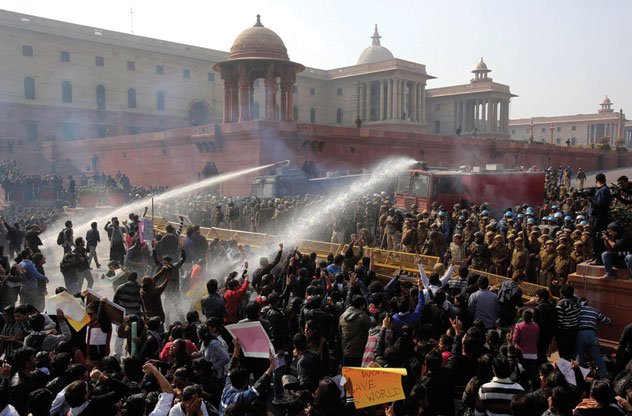 (Above): Water canons deployed to keep the demonstrators at bay near Rashtrapati Bhavan, in New Delhi, India. The people of India have been outraged by the gang rape and the government’s inaction and delay in providing justice to the deceased victim. [Reuters] (Above): Water canons deployed to keep the demonstrators at bay near Rashtrapati Bhavan, in New Delhi, India. The people of India have been outraged by the gang rape and the government’s inaction and delay in providing justice to the deceased victim. [Reuters]
As is well documented, figures of heinous crimes against women in India are among the worst in the world, whether dowry deaths, rape, honor killings, female infanticide and feticide. There are also numerous incidents of molestation, teasing, domestic violence and sexual harassment in the work place.
However, India does not even make it onto the list of top countries where women are raped. That is partly because Indian women are the victims of deep-seated social prejudices, in a society that sees men as superior and virile.
Rape is one of the most under-reported crimes on the tally sheets, not just in India but across the world. Even in the United States, where feminism has led to dramatically increased awareness of women’s rights, only about a third of rapes are believed ever reported. In India, women’s rights organizations report, the minuscule numbers of women who do report that they have been assaulted often discover that the police won’t record the assaults. Rape statistics in India are thus basically meaningless.
One stark reality of such regressive attitudes is that the sex ratio in India has dipped sharply in many states and especially so in deeply patriarchal northern states such as Rajasthan and Haryana. Across the country, the easy availability of amniocentesis and ultrasound has resulted in an overall ratio of 850 girls born against 1,000 boys.
Following the Delhi incident, there have been calls that rapists be hanged. Congress Party president Sonia Gandhi called the crime a “shame for all of us who are responsible for security of our cities,” and demanded that the country’s Home Minister and Delhi Chief Minister deliver strict punishment for the guilty and better protection for women in the capital. Women parliamentarians staged protests inside the Parliament to raise the issue of safety of women in the national capital.
The issue of violence against women in India, however, has ignited a debate about the justice system’s systemic failure to address the unchecked and alarming increase of crime in general.
The attacks on women are not about a few men losing their mental balance. Critics accuse authorities and custodians of law themselves as being culpable.
At least 20 men accused of raping women have run in Indian elections in the last five years, according to a report published recently by the Association for Democratic Reforms, an India-based think tank.
India’s highly corrupted system fails to deliver justice in the normal course, critics say, unless a particular instance is highlighted on national TV, as has happened in the unfortunate rape of the girl in India’s national capital.
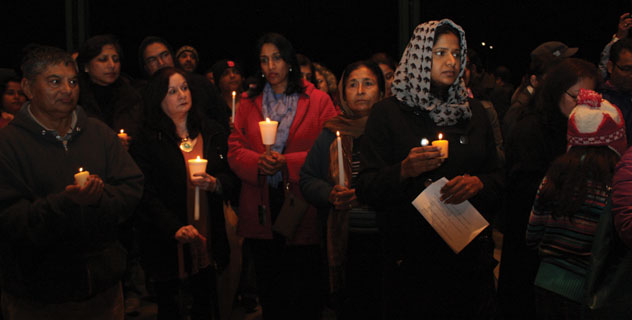 (Above): People hold lit candles at the vigil at Lake Elizabeth Park in Fremont, Calif., Jan 6. [Amar D. Gupta | Siliconeer] (Above): People hold lit candles at the vigil at Lake Elizabeth Park in Fremont, Calif., Jan 6. [Amar D. Gupta | Siliconeer]
A culture of impunity exists in the country, with lawbreakers believing they can get away with wrongdoing, as with the accused rapists running for office. At the very top, politicians twist situations in their favor with the police and judiciary active accomplices, creating a subculture of thugs and rogues, who think nothing about breaking the law. The criminal antecedents of majority of India’s political leadership are a major cause for concern.
Such a paradigm engenders an army of violence-prone crooks, mostly young men in their teens or 20s that indulge in burglaries, chain snatching, stealing cars, laptops and cell phones. Some graduate from petty to major crimes, including rape. The repeat offenders go about their business confident in the knowledge that they will never be punished for their crimes.
Even if they are caught, they quickly secure bail and carry on their activities that sponsor indulgent lifestyles and more money. It is no surprise that the main perpetrator of the attack on the girl in Delhi was a known bad character involved in looting and robbery in the past.
In another recent highly publicized rape of a young foreign national in Mumbai, the rapist was out on bail for attempted robbery. Why were there no institutional checks to ensure that they were under some sort of surveillance?
Too many law-abiding citizens in India do not differentiate between crooks and cops who don’t care. Many policemen turn partners in the crime, demanding their share of the illegal booty and for allowing mafias and local gangs to flourish.
Serious crime such as murders, attacks on senior citizens and even rape are ignored, not investigated and many times not even registered by the police, anxious to portray good performance on paper to seniors and healthy statistics to the larger public via the media.
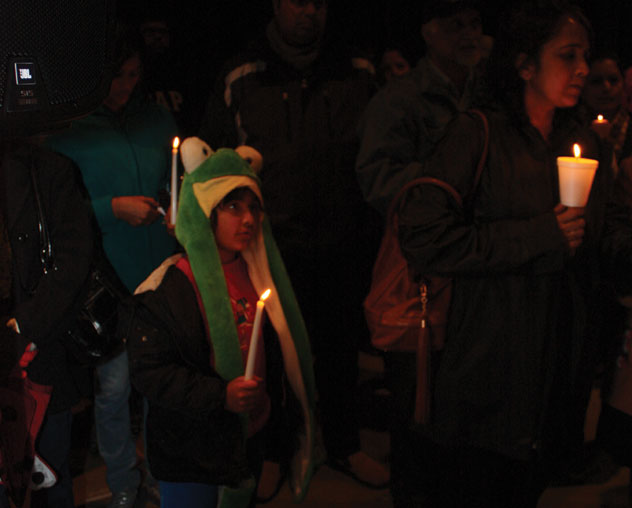 (Above): The Fremont vigil saw people of all ethnicities, young and old, come to light a candle in honor of the victim and in protest against the slow reaction of the Indian government in dealing with the criminals. [Amar D. Gupta | Siliconeer] (Above): The Fremont vigil saw people of all ethnicities, young and old, come to light a candle in honor of the victim and in protest against the slow reaction of the Indian government in dealing with the criminals. [Amar D. Gupta | Siliconeer]
Invariably, the first reaction of the police is to shoo away a complainant rather than lodge a report. The perverts who raped the girl in Delhi, called the ‘rape capital of India’ due to the large number of assaults on women in the city, were sure that they would never be caught. If the incident had happened in a rural hinterland away from the glare of TV channels, their thinking would have been right.
There is no dearth of laws in India, but nobody cares about enforcement due to ineffective policing and overburdened judiciary.
Although there are statutes and fines against littering, noise pollution, even urinating in public, none are enforced although when there is concerted action, it shows. For example, the Delhi Police campaign against drunk driving has yielded results. More concerted efforts are urgently needed.
— Siddharth Srivastava
Indian Rape Protests Foretell Feminist Spring
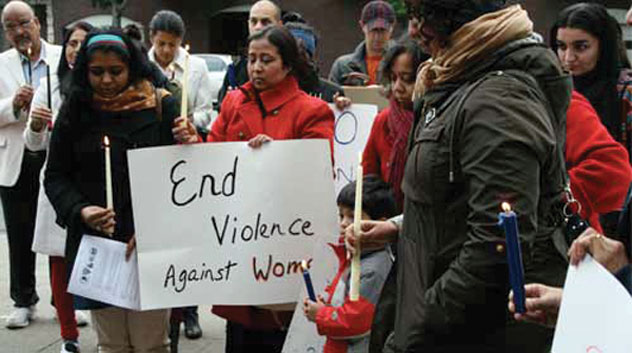 (Above): In San Francisco, some 70 social rights activists held a candlelight vigil outside the Indian consulate on Dec. 28 to show solidarity with protestors in India. What was meant to be a vigil, turned into a memorial service for the raped victim who died only hours earlier that day. [Viji Sundaram photo] (Above): In San Francisco, some 70 social rights activists held a candlelight vigil outside the Indian consulate on Dec. 28 to show solidarity with protestors in India. What was meant to be a vigil, turned into a memorial service for the raped victim who died only hours earlier that day. [Viji Sundaram photo]
SAN FRANCISCO – As a co-founder of Narika, a Bay Area-based helpline for South Asian victims of domestic violence, I have come across many incidents of sexual assault against women in my community. It happens with numbing regularity.
But few things have struck a chord in me as powerfully as the news of the 23-year-old, female medical student’s brutal gang rape on a Delhi bus Dec. 16 by six drunken men.
The rape and her subsequent death last week from severe organ damage have traumatized the nation and touched off widespread outrage throughout the country. Even after her cremation, thousands continue to take to the streets nationwide to demand the government take steps to stem violence against women.
So I ask myself, is India on the verge of a Feminist Spring?
For too long, women in India have been viewed as second-class citizens, always expected to walk a few proverbial steps behind their male partners. Not only in public, but in homes as well, violence against women is an all-too-common occurrence, both in India and among Indian communities here in the United States.
And while sexual violence against women happens everywhere, including countries like the Congo – labeled by the United Nations as the rape capital of the world – the horrific attack in India appears to have become the tipping point for a wider, Arab-style revolt against this historic injustice, one that is now spilling beyond India’s borders.
Here, in San Francisco, some 70 social rights activists from all across the Bay Area and from every racial and ethnic stripe held a candlelight vigil outside the Indian consulate on Dec. 28 to show solidarity with protestors in India. Narika, Trikone, ASATA (the Alliance for South Asians Taking Action) and the Asian Women’s Shelter co-sponsored what was meant to be a vigil but turned into a memorial service for the raped victim who died only hours earlier that day.
A sign held by one participant summed up the demands of those gathered: “Dear Delhi Government, Do Your Job.”
But as Bay Area activist and journalist Papiha Nandy observed at Friday’s event, whatever policies and laws are enacted by the Indian government to protect women, those laws must be backed by deeper cultural changes.
Following the attack, the six rapists were arrested and have since been charged with murder, rape and other crimes. Sonia Gandhi, considered India’s most powerful politician, recently told protestors: “I want to assure you that your voice has been heard.”
She urged the country to scale back on New Year’s Day celebrations.
Still, since the Dec. 16 rape another 20 have been reported in Delhi, dubbed the rape capital of India. Last year alone, 24,206 rape cases were reported nationwide, up by 10 percent from 2010. Activists say even that number is a gross underestimate as victims are often either too embarrassed or too fearful to complain.
What is especially galling for women in India is the attitude of the police toward rape victims. Many law officials and politicians seem to think that women who don’t wear the traditional sari or the salwar kameez deliberately invite rape. One police officer recently told a reporter from Tehelka, the New Delhi-based hard-hitting, online weekly news magazine, that alcohol and opportunity are sufficient — and just — cause for rape. The reporter cites one male police sub-inspector as saying: “She is dressed in a manner that people get attracted to her. In fact, she wants them to do something to her.”
A 17-year-old woman, gang-raped in Punjab in November, ingested poison and died last week after police allegedly told her to drop charges against the rapists and advised her to marry one of them.
It is resentment against such crimes – and the indifference of police and politicians – that is now exploding across India.
In late 2010 a Tunisian fruit vendor named Mohamed Bouazizi set himself on fire in protest against that country’s authoritarian regime. Credited with having kick started the Arab Spring, Bouazizi’s act was fueled by a population chafing against an oppressive government. That same sentiment was shared by many across the region and provided the tinder for what followed.
Tunisians described Bouazizi’s death as the “drop that tipped over the vase.”
For Indians everywhere, the gang rape and murder of an innocent 23-year-old may be that drop.
— Viji Sundaram
Candlelight Vigil in Fremont
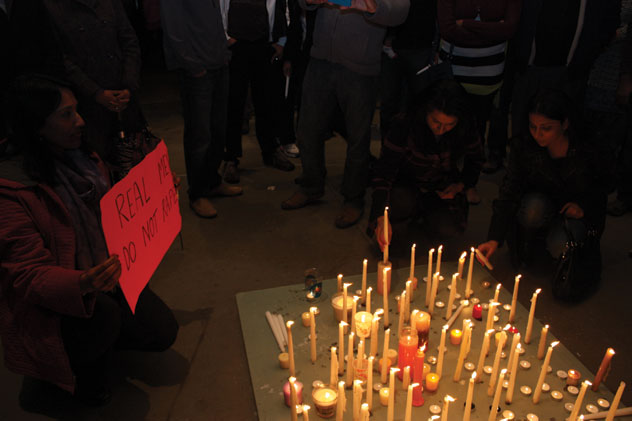 (Above): Over a hundred people attended a candlelight vigil held at Lake Elizabeth Park in Fremont, Calif., Jan. 6. [Amar D. Gupta | Siliconeer] (Above): Over a hundred people attended a candlelight vigil held at Lake Elizabeth Park in Fremont, Calif., Jan. 6. [Amar D. Gupta | Siliconeer]
FREMONT, Calif. — A candlelight vigil to remember the 23-year-old student was held in Fremont, Calif., Jan. 6, at Lake Elizabeth Park.
Over a hundred people braved the cold weather and rain to show solidarity towards the victim of this heinous crime.
Emotions were high as vigil proceeded with a moment of silence and prayer, followed by speeches from GOPIO Silicon Valley’s Ajay Bhutoria, Senator Ellen M. Corbett (D-Calif.), Milpitas Mayor Jose Esteves, Fremont city planning commissioner Yogi Chugh and an associate, and Radio Zindagi’s Neeraj Dhar.
People signed a petition and lighted candles. As pointed by Bhutoria, the purpose of these vigils is more than just a gathering of people to protest, it is a way to send a message to the authorities.
The heinous crime that occured almost a month ago has shocked the people of India. Whether the same can be said for the ‘still silent’ government, remains to be seen.The people of India and the world is watching.
|